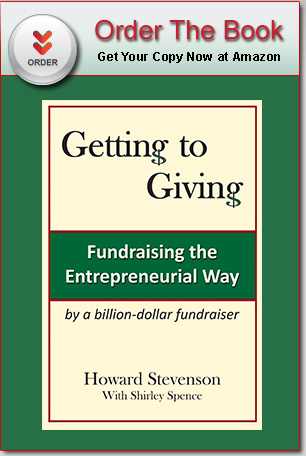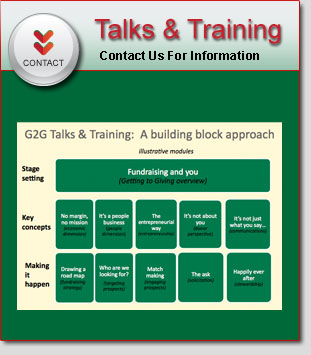Some months ago, we were asked to lead a day-long seminar for a group of philanthropic leaders. We decided to ask them to complete a Fundraising and You survey beforehand, as a “pulse check” on their experience, attitudes and issues. The results were quite illuminating.
As philanthropic leaders, our seminar participants played multiple roles: donors, fundraisers board members.[1] They often supported multiple organizations, ranging in size, mission and geographic scope. Nevertheless, they identified a number of common issues facing those organizations. They included:
- Money and the economy. Resource needs are escalating (demand for services, rising expenses, investment needed to scale) while it is tougher and tougher to raise money (donor fatigue, declining endowment returns, drops in membership support).
- Running the business. Building organizational capacity (governance, talent, strategic planning, fundraising) is a challenge. Mission focus is blurry. And “capacity to recognize change in a changing world and take creative, thoughtful action” is lacking.
Our philanthropic leaders devoted considerable time to fundraising. There were those who enjoyed or even loved fundraising, and felt they were very good at it. And there were some encouraging, even inspiring responses to “please describe your best fundraising experience.” A few examples:
- “I like fundraising with people who have never given, so I can help them identify something that they want to support.”
- “A long time small donor under $5000, gave a $100,000 grant in order to expand the program’s reach.”
- “Developed a strategic alliance approach for our organization, which was successfully used over the years to attract and keep several corporate donors in the $100,000+ per year category.”
- “Because of my conversations, having a person become interested in the work I really care about and supporting it themselves (in both monetary terms and by talking to others about it).”
- “Having a donor self-solicit for a surprise seven-figure gift.”
- “I made a leadership gift to an institution i care a great deal about and got a personal call from the one person outside the hierarchy of that institution that I have the utmost respect for, saying thank you. He didn’t have to make that call.”
- “Made them laugh, made them cry, made them write a check. And then we cried together!”
Alas, many participants were less than wildly enthusiastic about their fundraising work. Over fifteen percent “tolerated it,” and another thirty-five percent had “neutral or mixed” feelings. They also were less than confident in their abilities. Approximately one-fourth of respondents said they were “terrible” or “somewhat effective” while another third claimed to be “moderately effective.” The winner of the “worst fundraising experience” prize, in our humble opinion: “I called on someone and discovered from her daughter that the person recently died.” Ouch.
All of these individuals, however, had taken time out of their busy lives for a seminar devoted to advancing the causes they believed in. Collectively, the group was looking to get a fresh perspective on fundraising, get re-energized about their philanthropic work, learn and share new techniques and skills, and take what they had learned back to their organizations.
We share this survey with you not so much for the responses as for the questions. How would you respond? What about your fundraising colleagues? The donors you approach? How can you get more comfortable with and be more effective at fundraising?
[1] The majority of attendees were volunteers. A few brought executive directors of organizations they served.



